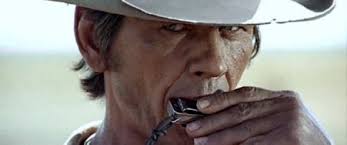BUT thankfully over the weekend I watched Once Upon A Time in the West, a 1968 film directed by the king of spaghetti westerns, Sergio Leone. Like most of his films, I spent the first hour trying to work out which cowboy was which (there were three main ones, each with their lackeys, and they all look kind of the same and sound the same and shoot people, and some of them were pretending to be other ones. So it's this whole confusing thing).
But it was such a joy to watch, for three main reasons:
1. The cinematography. waahhh there just aren't words. It was beautiful: not just because of the amazing desert landscape, but also the facial-close ups (kind of making the face a landscape to written onto as well). For example:
The cowboys always fill the screen, even if, like the second screenshot above, the desert actually takes up more space. Sergio Leone is known as one of the first directors to make 'films-about-films' and Once Upon a Time in the West is a type of meta-western, simultaneously an homage to, and reworking of, the American western TV shows that were very popular in the early 60s. That every shot seems overwhelmed by men - and men who almost all die - perhaps signifies the impossibility of American TV cowboy ideology (the glorification of the frontier, expansion, violence, etc) actually surviving (or perhaps that Leone thought it should be 'killed off').
2. The story line. SO COMPLEX! I mean seriously, it was almost unnecessarily full of red herrings. But this was the great thing about it - it was not predictable at all and defied the Western fomulae that had, till this point, been assumed. For example, the three cowboys in the opening scene (shown in the bottom right screenshot above) are actually actors that have previously been cast as successfully violent cowboys in early American Westerns. They all get shot within the first five minutes and you realise: this film is about breaking down the stereotype. These men that who have committed violence in the name of America will be brought down. Ironically, it is another lone, American cowboy who shoots them. Here we see the cowboy at once vilified and exonerated (but I haven't thought about this enough to provide an interpretation yet).
Leone provides a plethora of characters (the three cowboys - Harmonica, Frank and Cheyenne, a robber-baron, a young beautiful widow, and some other side characters) to mix and intermingle so many typical western storylines that it's hard to know what the film was actually about, or to articulate its plot. But I think this was intentional. Leone seems to have brought all these familiar storylines together in a way that is quite difficult to interpret, so that any reigning, America-focused narrative becomes not only impossible to read, but in fact absent.
 | |
| Cardinale as Jill McBain |
Cheyenne, at the end of the film, says to her: "You know what? If I was you, I'd go down there and give those boys a drink. Can't imagine how happy it makes a man to see a woman like you. Just to look at her. And if one of them should pat your behind, just make believe it's nothing. They earned it." I mean, excuse me? I know, I know, it was '68 and '70 feminism hadn't quite made headways but STILL! "They earned it?" Who writes that? And the thing is, Jill does walk contentedly out into the midst of the workmen, bringing them water, like some sort of eternal female figure, a whore providing life-giving nourishment. Jill's character may have been complex but her objectification is portrayed as natural, and in fact, somehow good and life-giving. Gross. But, I guess women in Westerns had to start somewhere, right?
There are so many other great things about the film - the soundtrack, for one. Also it's clear Tarantino has watched this film about a gazillion times, the music, the cowboys, the stand-offs, the deliberate dialogue have pretty much just been inserted into the Kill Bills. But everyone should watch Once Upon a Time in the West. It will make everyone want to move to California and everyone want to marry a cowboy (even if you're a man. Trust me they're amazing).




It is always fun to see you have posted something new.
ReplyDeleteI am currently reading Ivanhoe by Scott - not exactly your era, but lots of violence, gender issues and social commentary.
Jules you write so well...I love reading your impassioned reactions to all texts violent and gender bending/conforming.
ReplyDeleteI hear you're becoming quite the Scot! I look forward to hearing more.
Hey Julia, it's Prithvi. I love this movie; it's one of my favourite spaghetti westerns. the soundtrack always blows me away!
ReplyDelete